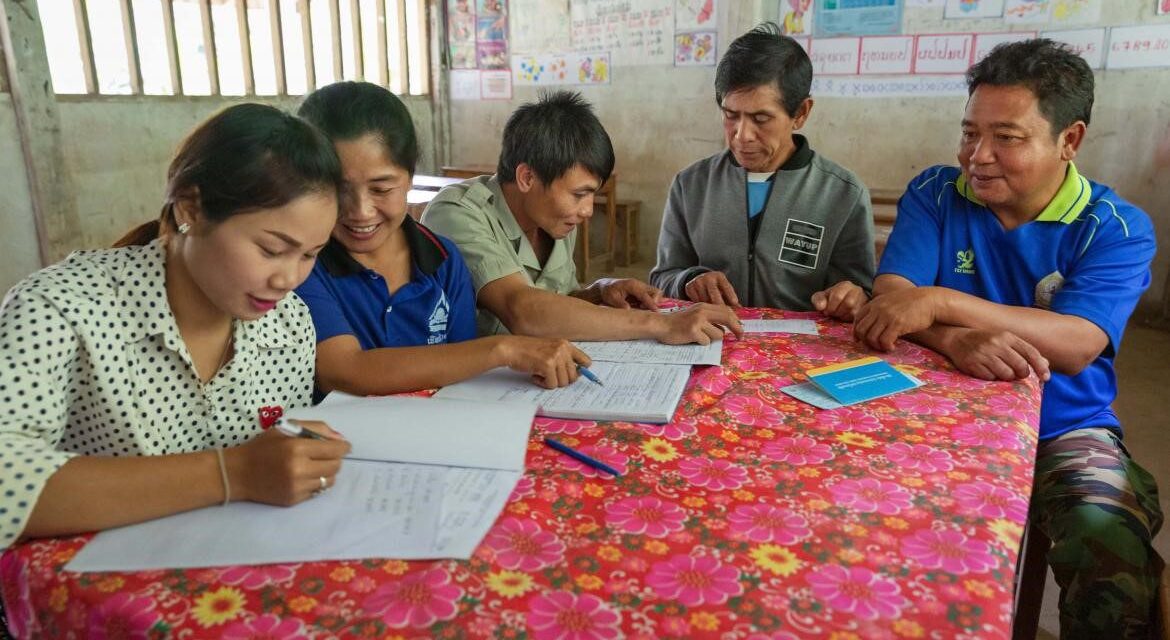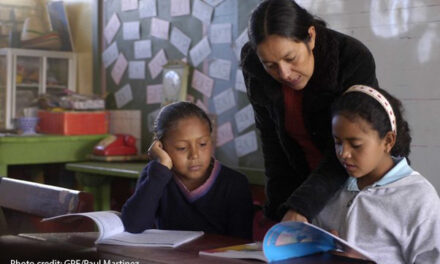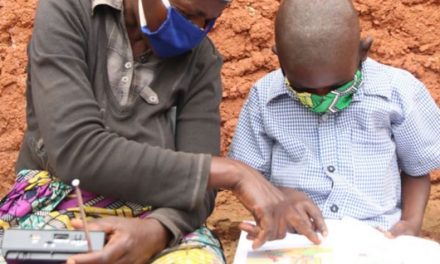This blog was written by Sameer Sampat and Azad Oommen, Global School Leaders and originally published on the Global Partnership for Education website on 4 May 2020.
Whether they are called headmasters, principals or directors, school leaders play an important motivating and coordinating role in education systems’ COVID-19 responses. Here are our recommendations to support them in this critical role.
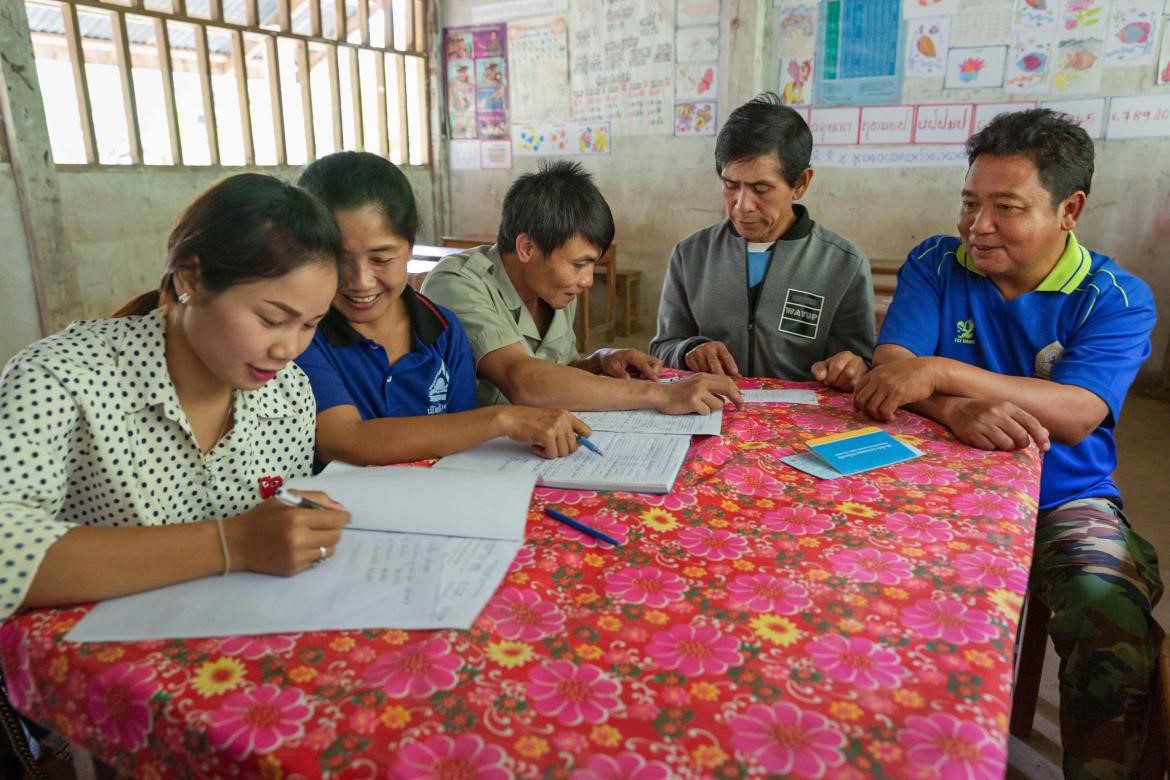
Teachers, the school principal and the village chief meet to discuss school finances and priorities. Khokkham Primary School, Pak Ou District, Lao PDR. GPE / Kelley Lynch
Over the past few weeks, school leaders’ roles have been unexpectedly and dramatically changed by the COVID-19 crisis. The unprecedented nature of this situation means there is no set direction for them to follow.
School leaders are like actors in a play where the story, the script and costumes have all changed mid-performance, and they are on stage improvising to adjust to their new role.
Very few school leaders have thorough training and support for their role, and even fewer have been given clear guidelines on their expectations through disaster response and recovery.
Despite these daunting circumstances, we have seen incredibly inspiring school leaders acting to ensure the safety and wellbeing of families and minimizing the disruption faced by out-of-school children.
In order to understand how school leaders are facing this situation, Global School Leaders with our four partner organizations came together to implement a short survey from April 7 to 14 and received responses from over 1,800 school leaders across 12 countries.
“I personally started calling most of the parents and students and explained the current situation of a school and also will make sure that the management will take necessary steps to overcome the current situation. STAY HOME, STAY SAFE…” a school leader from India (7 April 2020)
“I have informed my teachers and our parents about available relief aids of the government and others. I’ve also given financial assistance too during this period.” a school leader from Nigeria (9 April 2020)
“I am giving support to teachers, students, and parents to be enthusiastic in implementing online learning. I am reminding them to take care of their health by washing their hands with soap, wearing masks if they leave the house, avoiding crowds during a pandemic.” a school leader in Indonesia (13 April 2020)
Having the respect and personal relationships with their students’ families, school leaders are uniquely positioned to guide them on how to support their children at home during this exceptional challenge.
We believe that education systems must define clear roles and supports for school leaders to respond to the impacts of school closures, and support them in advance through the steps to reopening schools whenever that occurs.
Recommendation 1: Clearly define the role of school leaders in crisis response
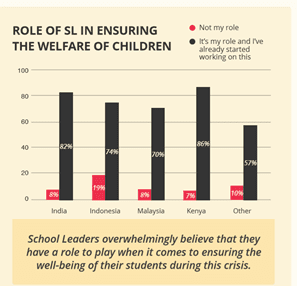 A key insight from our survey was that school leaders strongly feel responsible for ensuring the welfare of their students during this crisis. This sense of responsibility can be further utilized to support their communities. It is critical that governments set clear guidelines on what is expected of school leaders and well as providing support and resources required to perform their roles.
A key insight from our survey was that school leaders strongly feel responsible for ensuring the welfare of their students during this crisis. This sense of responsibility can be further utilized to support their communities. It is critical that governments set clear guidelines on what is expected of school leaders and well as providing support and resources required to perform their roles.
School leaders have an important perspective in the challenges faced by their communities, and their voices should be incorporated when defining their role during the crisis. Globally, our school leaders are most concerned with student well-being, online teaching and finances, in that order.
We believe that school leaders should be tasked with inspiring and coordinating their teams to have collective action to address these top three concerns. Government systems can take action to guide school leaders through this process. We have put together a list of recommendations for governments and school leaders.
Recommendation 2: Enlist school leaders to lead the process to re-open schools
When schools eventually re-open, we expect that school leaders will face a high burden in quickly creating safe and healthy learning 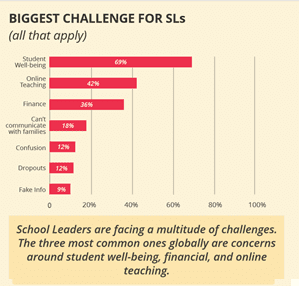 spaces for their students. Drawing on the literature that focuses on schools emerging from disasters, we believe that leaders will have to address the following factors:
spaces for their students. Drawing on the literature that focuses on schools emerging from disasters, we believe that leaders will have to address the following factors:
- Mental health and wellbeing challenges among teachers and students who may have suffered from anxiety, depression, isolation or malnutrition. School leaders will have to be trained in identifying symptoms of these challenges and in lay practitioner methods to address these.
- Learning losses among children – we anticipate these losses to be more severe in schools that were of lower quality, as the base of learning among students would already have been lower. Rapid remedial lessons with competency-based grouping may be the answer to this challenge, but this will require additional support for leaders and teachers.
- Loss of students and teachers – we know that in urban areas, migrant workers (including teachers) have headed back to rural homes during the crisis. While many will come back to their urban homes, many may not. And depending upon the eventual spread of the coronavirus, there could be loss of lives among teachers, parents and students. School leaders will have to plan for various scenarios and adjust depending on the situation as schools reopen.
- Ensuring adequate supplies – With the interruption in supply chains, things like textbooks and learning materials may be in short supply, and it will fall on school leaders to figure out plans for learning to continue.
- Scheduling and other logistical challenges – Depending upon how controlled the return to fully open communities is, there may be scheduling challenges – for instance, older children may return to school first followed by younger children later. This would mean that school leaders will have to be prepared for operating their schools with a high degree of flexibility.
Recommendation 3: Develop programs to train and connect school leaders
It is important to provide support to leaders to face the challenges we want them to lead through. Moving toward context-specific, online professional development programs is a critical support for leaders.
As an example, in Malaysia, one of our organizations, Pemimpin, conducted an online workshop attended by more than 100 school leaders. They highlighted examples of school leaders who have responded innovatively to this crisis: one example is a school leader who has mobilized her teachers to run classes for each of their grade-level through the online messaging system Telegram. Pemimpin are following this up with coaching calls to school leaders to support the leaders connect families who need support with basic necessities to government or philanthropic entities that can provide them.
Through our initial online work with school leaders one lesson we have come to is that a key role for education systems during this time is to connect school leaders in peer groups so that they can rapidly share best practices. School leaders have a unique insight into the challenges being faced by their communities and some of them are being quite innovative and resourceful during this time. We have found school leaders to be overwhelmingly open to sharing their ideas.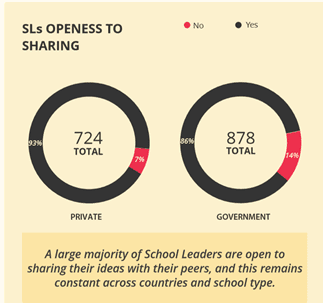
The challenges faced by education systems are vast. School leaders are an important layer in the education system that can act as a motivating and coordinating agent to ensure teachers, students and families are connected to plans made by education officials.
Additionally, strong school leaders know the needs of their communities well and can help effectively marshal the available resources to those who need them.
Thus education systems should also be guiding, coordinating, and amplifying the efforts school leaders are already making. As Kaya Henderson, former Superintendent of Washington, DC schools, said in a recent op-ed, “Maybe a problem this big doesn’t just need a big solution. Maybe it needs a million local, community solutions.”

